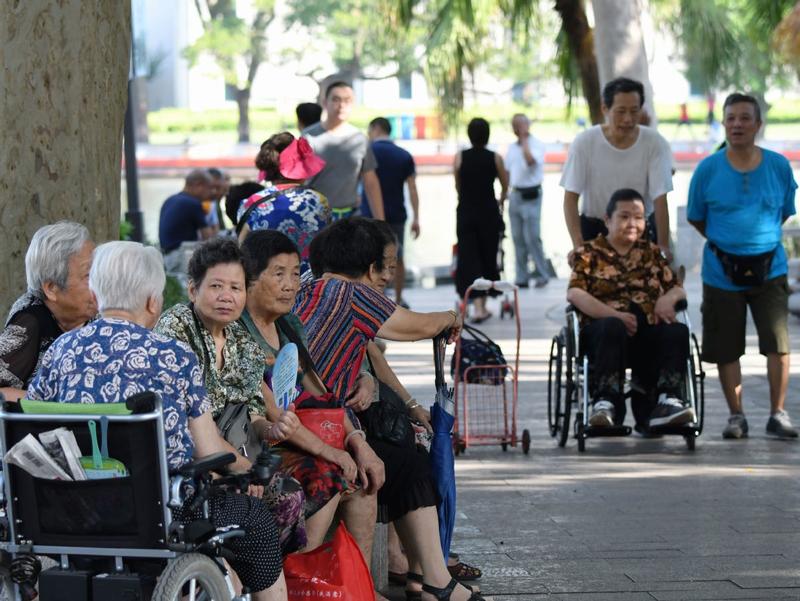 Senior visitors gather at a park in Fuzhou, Fujian province, in this file photo. (PHOTO / XINHUA)
Senior visitors gather at a park in Fuzhou, Fujian province, in this file photo. (PHOTO / XINHUA)
The State Council, China's Cabinet, has issued a document, "Opinions on Promoting the Development of Private Pensions", detailing the development of the first-ever private pension plan, which indicates that China is trying to develop a multi-pillar pension system.
The private pension system will complement the existing pension system consisting of "three pillars"-basic old-age pension, enterprise annuity, and commercial insurance for elderly people. The market-oriented new pension system will offer another layer of support to the aging population, by helping increase citizens' sources of income, thus improving their quality of life and enhancing their sense of fulfillment.
Under the new pension plan, individuals can invest funds from their pension in a range of financial products. This will mean creating more options for them to increase their income and attain financial stability, and opening up a lucrative new market for banks and financial companies.
Five major features mark the new pension plan. To begin with, people covered by the basic pension insurance for urban employees or basic pension insurance for non-employees can invest in the new pension scheme.
That the new pension system will supplement, rather than replace, the existing system is borne out by the fact that people will not be allowed to exit the basic pension insurance system to invest in the new pension system. Workers who currently contribute to the basic pension insurance can participate in the new pension system on a voluntary basis.
In fact, the new pension plan will help optimize the existing pension system instead of being an assistance program for the elderly living in relative poverty. Still, some misunderstandings about the private pension plan should be cleared. For example, it cannot remedy or replace the basic pension insurance system for flexibly employed workers, and cannot be compared with the United States' 401(k) plan, which is an employer-sponsored retirement savings plan.
Another feature of the new system is that it will ensure income security for the aging population. Target-date funds and investments are major financial products in China-their market shares have reached 100 billion yuan ($15 billion) and 50 billion yuan respectively. But they can only provide buyers with short-term financial gains. In contrast, the pension insurance plan can help the elderly deal with post-retirement uncertainties and ensure a steady flow of income.
Also, the government and the market will shoulder their due responsibilities in ensuring the private pension plan works. While funds from private pension accounts can be used to purchase financial products and commercial endowment insurance, for instance, people, especially pensioners, should understand that every savings and investment product carries risks and yields different kinds of returns.
As for the government, it will guide and support the private pension system by, among other things, offering tax incentives and encouraging participants to properly assess the financial products and better manage their disposable retirement funds.
But since not everyone in China pays personal income, tax incentives are likely to have a limited impact on the success of the system. For example, people don't need to pay tax for the returns on financial products, but pensioners do so when withdrawing money from their individual pension account. Therefore, many may choose to spend their savings on investment rather than using them to open a private pension account.
In addition, the scheme will allow people to contribute up to 12,000 yuan a year to an individual pension account that would be subject to closed-end management, so they can meet their pension needs. And as China's per capita disposable income reached 35,128 yuan in 2021, the effect of adverse transfer during income redistribution may not be strong.
Moreover, according to the State Council document, the scheme will be piloted in some cities for a year before being implemented nationwide. Hence, the government can appropriately address the concerns of the public and the market, test the stability and compatibility of related platforms, and strengthen the monitoring system before launching the plan nationwide.
The private pension plan will also benefit the financial market, the banking system in particular, as pensioners will need to open new accounts to purchase related products. And the scale and effects of the new pension system will be decided by favorable policies, people's disposable income and financial products' competitiveness.
The author is secretary-general of the China Association of Social Security, and an associate professor at Renmin University of China.
The views don't necessarily reflect those of China Daily.


